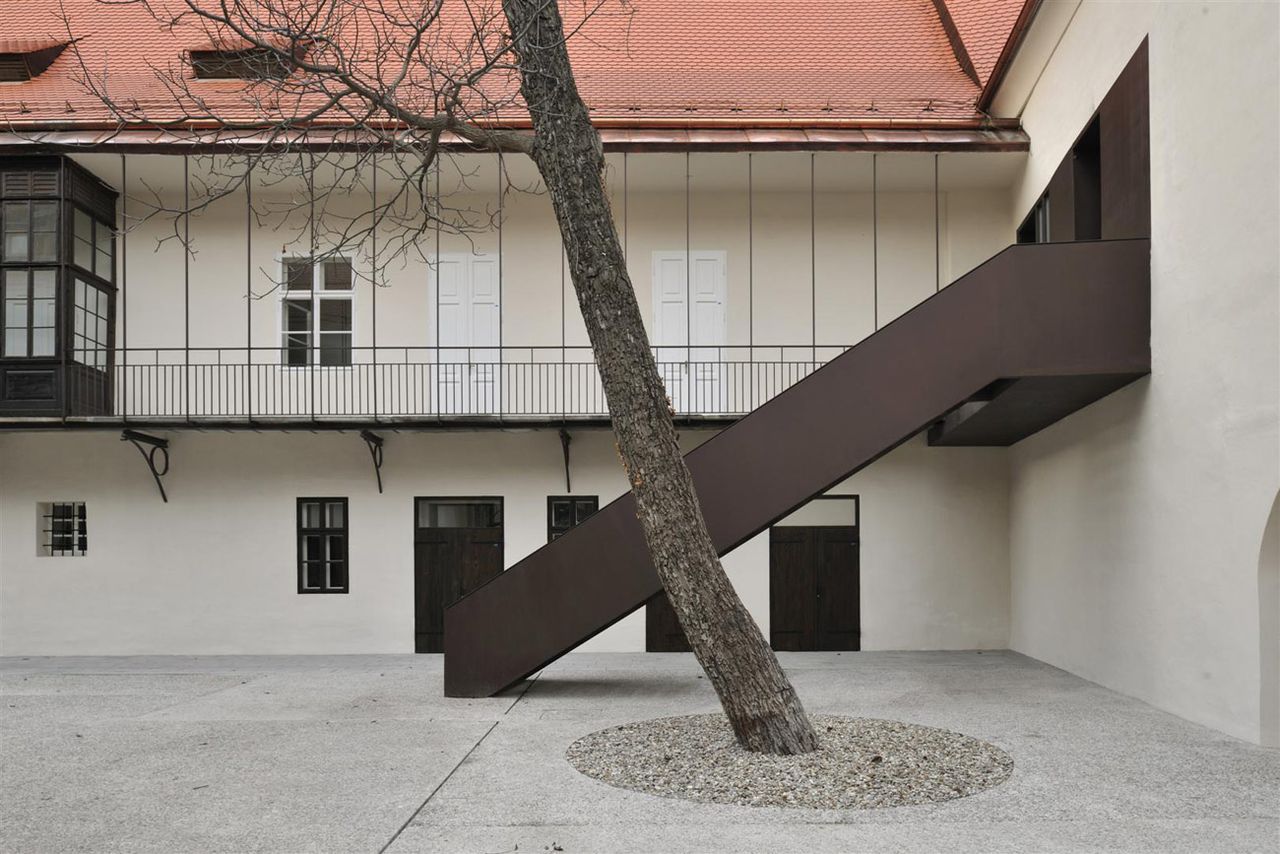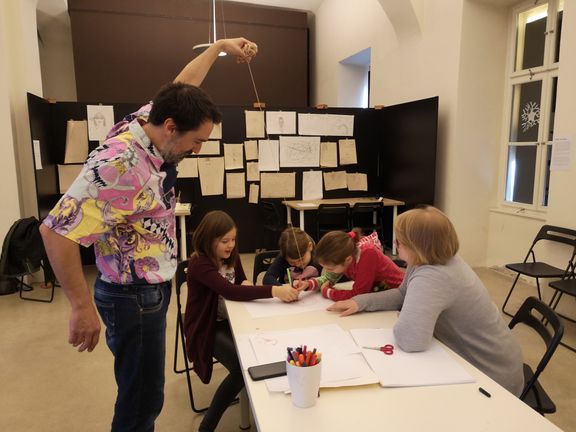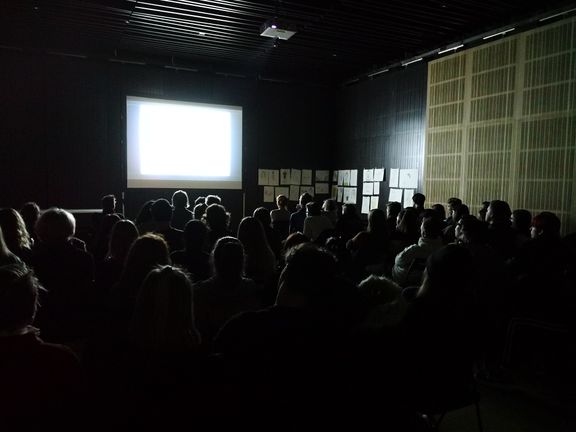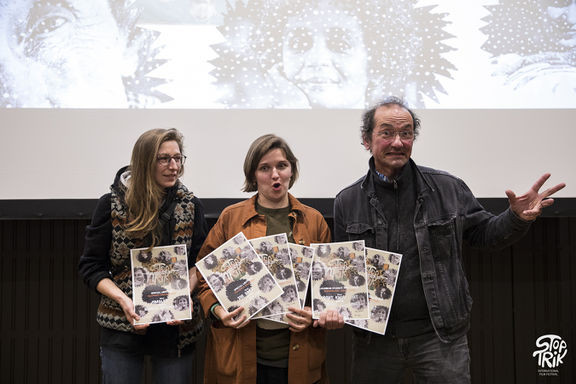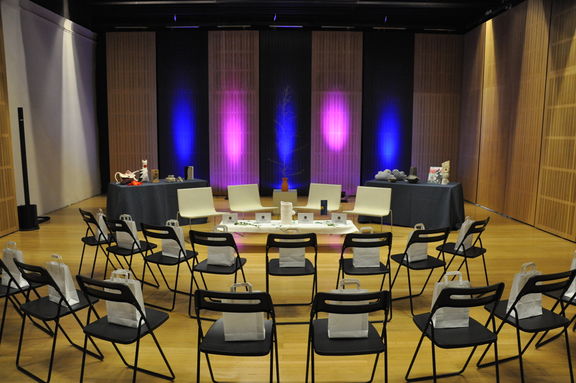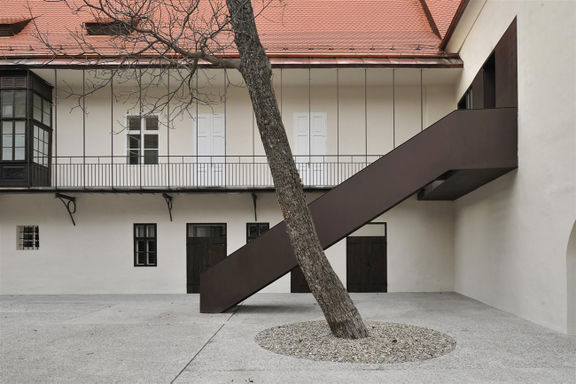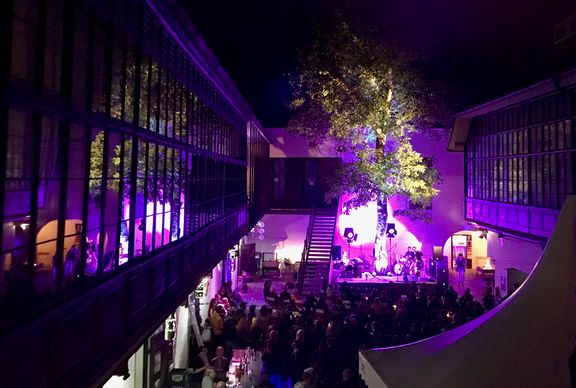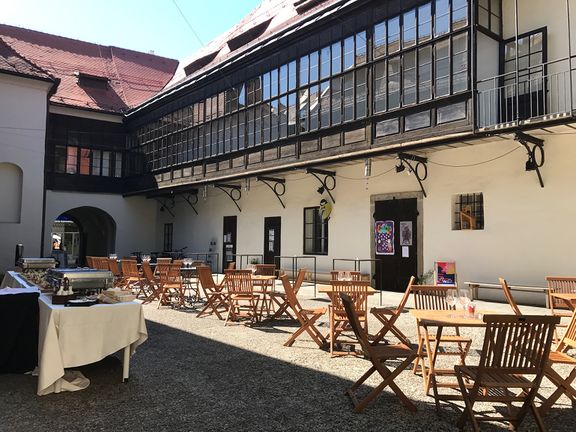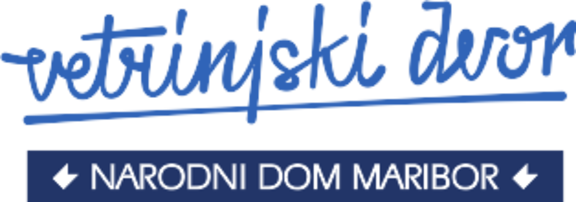Difference between revisions of "Vetrinjski dvor"
Anže Zorman (talk | contribs) (Added Wetrinsky) |
(removed Design venues using HotCat) |
||
| (11 intermediate revisions by 2 users not shown) | |||
| Line 1: | Line 1: | ||
{{Article | {{Article | ||
| − | | status = NIFERTIK! | + | | status = NIFERTIK! PHOTO |
| maintainer = Anže Zorman | | maintainer = Anže Zorman | ||
}} | }} | ||
| Line 47: | Line 47: | ||
{{Teaser| | {{Teaser| | ||
| − | [[Vetrinjski dvor]] (Vetrinje Mansion) is a multifunctional venue, | + | [[Vetrinjski dvor]] (Vetrinje Mansion) is a multifunctional venue, managed by [[Narodni dom Maribor]] and located in a renovated mansion in the historical centre of Maribor. Its main goal is to offer support to the regional non-governmental organisations as well as to creative individuals and facilitate their cultural and educational programmes and their particular production models. A varied set of spaces is also available for independent creators, artistic projects, festivals, and other cultural initiatives. |
In 2017, the [[Art club & cafe Wetrinsky]] was added into the mansion premises, running a wide-ranging programme from live concerts to dance sessions. | In 2017, the [[Art club & cafe Wetrinsky]] was added into the mansion premises, running a wide-ranging programme from live concerts to dance sessions. | ||
| + | |||
| + | {{Wide Image|Vetrinjski dvor 2013 Inner courtyard detail.jpg}} | ||
}} | }} | ||
| Line 56: | Line 58: | ||
Vetrinjski dvor (Vetrinje Mansion) has a history dating back to the 13th century, when it was used as an administrative seat for the local activities of the Viktring Abbey (which was otherwise based near the city of Klagenfurt). A few centuries later it was substantially enlarged and given its contemporary baroque look. In the 18th century Vetrinjski dvor passed into the ownership of the local gentry and for a time hosted the first Maribor theatre. In the 19th century, the house was in use by various rich traders and craftsmen, each of whom slightly adapted the house to his needs until 1945, when the building was nationalised after WWII. | Vetrinjski dvor (Vetrinje Mansion) has a history dating back to the 13th century, when it was used as an administrative seat for the local activities of the Viktring Abbey (which was otherwise based near the city of Klagenfurt). A few centuries later it was substantially enlarged and given its contemporary baroque look. In the 18th century Vetrinjski dvor passed into the ownership of the local gentry and for a time hosted the first Maribor theatre. In the 19th century, the house was in use by various rich traders and craftsmen, each of whom slightly adapted the house to his needs until 1945, when the building was nationalised after WWII. | ||
| − | In 1961, the building was declared as one of the most important Slovene architectural monuments and was in 2001 entered into the register of the "immovable cultural heritage in Slovenia". With the help of funds from the EU, the building was extensively renovated between 2007 and 2010, for which the [[Piranesi Award]] | + | In 1961, the building was declared as one of the most important Slovene architectural monuments and was in 2001 entered into the register of the "immovable cultural heritage in Slovenia". With the help of funds from the EU, the building was extensively renovated between 2007 and 2010, for which the [[Piranesi Award]] and the [[Plečnik Award|Plečnik Medal]] were granted to the architects [[Maruša Zorec]] and [[Matjaž Bolčina]], of the [[Arrea Architecture]] bureau. After that, it was used as the seat of the [[Maribor, European Capital of Culture 2012]] until its management was in 2013 passed to the [[Narodni dom Maribor]], who has given it its current concept. |
==Activities== | ==Activities== | ||
| − | The venue provides access through two types of activities. The first one is programme use, which features four cultural producers that have been given free office and studio spaces for the duration of three years. Selected on the account of the programme they presented in their application, these producers are currently | + | The venue provides access through two types of activities. The first one is programme use, which features four cultural producers that have been given free office and studio spaces for the duration of three years. Selected on the account of the programme they presented in their application, among these producers are currently [[Zavod Mars Maribor]] (mostly workshops) and [[GuestRoomMaribor]] (artist residency programmes). A part of mansions premises is occupied by [[Art club & cafe Wetrinsky]], where music concerts take place. |
The other type of access is project based and and as such offers a wide set of multifunctional spaces that can be used for an agreed amount of time. Besides the production space, organisations can use the necessary technical equipment and, if needed, can also receive consultations and support in the production. Besides concerts, jam sessions, workshops and other sporadic events, a number of festivals use Vetrinjski dvor for their activities, such as the [[Lent Festival]], the [[Maribor Theatre Festival]], the [[Stoptrik International Film Festival]], the [[Attacca Festival]], and the [[Contemporary dance Platform]]. | The other type of access is project based and and as such offers a wide set of multifunctional spaces that can be used for an agreed amount of time. Besides the production space, organisations can use the necessary technical equipment and, if needed, can also receive consultations and support in the production. Besides concerts, jam sessions, workshops and other sporadic events, a number of festivals use Vetrinjski dvor for their activities, such as the [[Lent Festival]], the [[Maribor Theatre Festival]], the [[Stoptrik International Film Festival]], the [[Attacca Festival]], and the [[Contemporary dance Platform]]. | ||
| + | |||
| + | {{Wide Image|Vetrinjski dvor 2017 Event at inner courtyard.JPG}} | ||
==Capacities== | ==Capacities== | ||
The programme use activities provide 5 small- to moderate-sized office spaces and studios and a pair of apartments. The project use activities offer a couple of larger spaces (an atrium, the Vetrinjski exhibition grounds, a foyer and some others) that can be used for multimedia presentations, theatre shows, concerts, exhibitions, receptions and film projections. A number of smaller, multifunctional studios and offices and a pair of open offices are used for co-working, intended for artists and other culture workers. | The programme use activities provide 5 small- to moderate-sized office spaces and studios and a pair of apartments. The project use activities offer a couple of larger spaces (an atrium, the Vetrinjski exhibition grounds, a foyer and some others) that can be used for multimedia presentations, theatre shows, concerts, exhibitions, receptions and film projections. A number of smaller, multifunctional studios and offices and a pair of open offices are used for co-working, intended for artists and other culture workers. | ||
| + | |||
| + | {{Wide Image|Vetrinjski dvor 2013 Conference room.JPG}} | ||
==See also== | ==See also== | ||
| Line 74: | Line 80: | ||
*[[GuestRoomMaribor]] | *[[GuestRoomMaribor]] | ||
*[[House! Society for People and Spaces]] | *[[House! Society for People and Spaces]] | ||
| − | *[[CGU Printmaking | + | *[[CGU Printmaking Art Centre]] |
*[[Attacca Festival]] | *[[Attacca Festival]] | ||
*[[Stoptrik International Film Festival]] | *[[Stoptrik International Film Festival]] | ||
| + | *[[Arrea Architecture]] | ||
== External links == | == External links == | ||
| Line 85: | Line 92: | ||
*[https://www.facebook.com/maribor.zavodmars Zavod MARS Maribor on Facebook] | *[https://www.facebook.com/maribor.zavodmars Zavod MARS Maribor on Facebook] | ||
*[https://www.facebook.com/center.graficnih.umetnosti CGU - Center grafičnih umetnosti on Facebook] | *[https://www.facebook.com/center.graficnih.umetnosti CGU - Center grafičnih umetnosti on Facebook] | ||
| + | *[https://www.arrea.si/si/details/vetrinjski-dvorec/16 Arrea Architecture's renovation project page] | ||
| + | |||
| + | {{Gallery}} | ||
| + | |||
[[Category: Venues]] | [[Category: Venues]] | ||
| + | [[Category: Updated 2017]] | ||
| + | [[Category:Music venues]] | ||
| + | [[Category:Visual arts venues]] | ||
Latest revision as of 09:05, 3 September 2019
History
Vetrinjski dvor (Vetrinje Mansion) has a history dating back to the 13th century, when it was used as an administrative seat for the local activities of the Viktring Abbey (which was otherwise based near the city of Klagenfurt). A few centuries later it was substantially enlarged and given its contemporary baroque look. In the 18th century Vetrinjski dvor passed into the ownership of the local gentry and for a time hosted the first Maribor theatre. In the 19th century, the house was in use by various rich traders and craftsmen, each of whom slightly adapted the house to his needs until 1945, when the building was nationalised after WWII.
In 1961, the building was declared as one of the most important Slovene architectural monuments and was in 2001 entered into the register of the "immovable cultural heritage in Slovenia". With the help of funds from the EU, the building was extensively renovated between 2007 and 2010, for which the Piranesi Award and the Plečnik Medal were granted to the architects Maruša Zorec and Matjaž Bolčina, of the Arrea Architecture bureau. After that, it was used as the seat of the Maribor, European Capital of Culture 2012 until its management was in 2013 passed to the Narodni dom Maribor, who has given it its current concept.
Activities
The venue provides access through two types of activities. The first one is programme use, which features four cultural producers that have been given free office and studio spaces for the duration of three years. Selected on the account of the programme they presented in their application, among these producers are currently Zavod Mars Maribor (mostly workshops) and GuestRoomMaribor (artist residency programmes). A part of mansions premises is occupied by Art club & cafe Wetrinsky, where music concerts take place.
The other type of access is project based and and as such offers a wide set of multifunctional spaces that can be used for an agreed amount of time. Besides the production space, organisations can use the necessary technical equipment and, if needed, can also receive consultations and support in the production. Besides concerts, jam sessions, workshops and other sporadic events, a number of festivals use Vetrinjski dvor for their activities, such as the Lent Festival, the Maribor Theatre Festival, the Stoptrik International Film Festival, the Attacca Festival, and the Contemporary dance Platform.
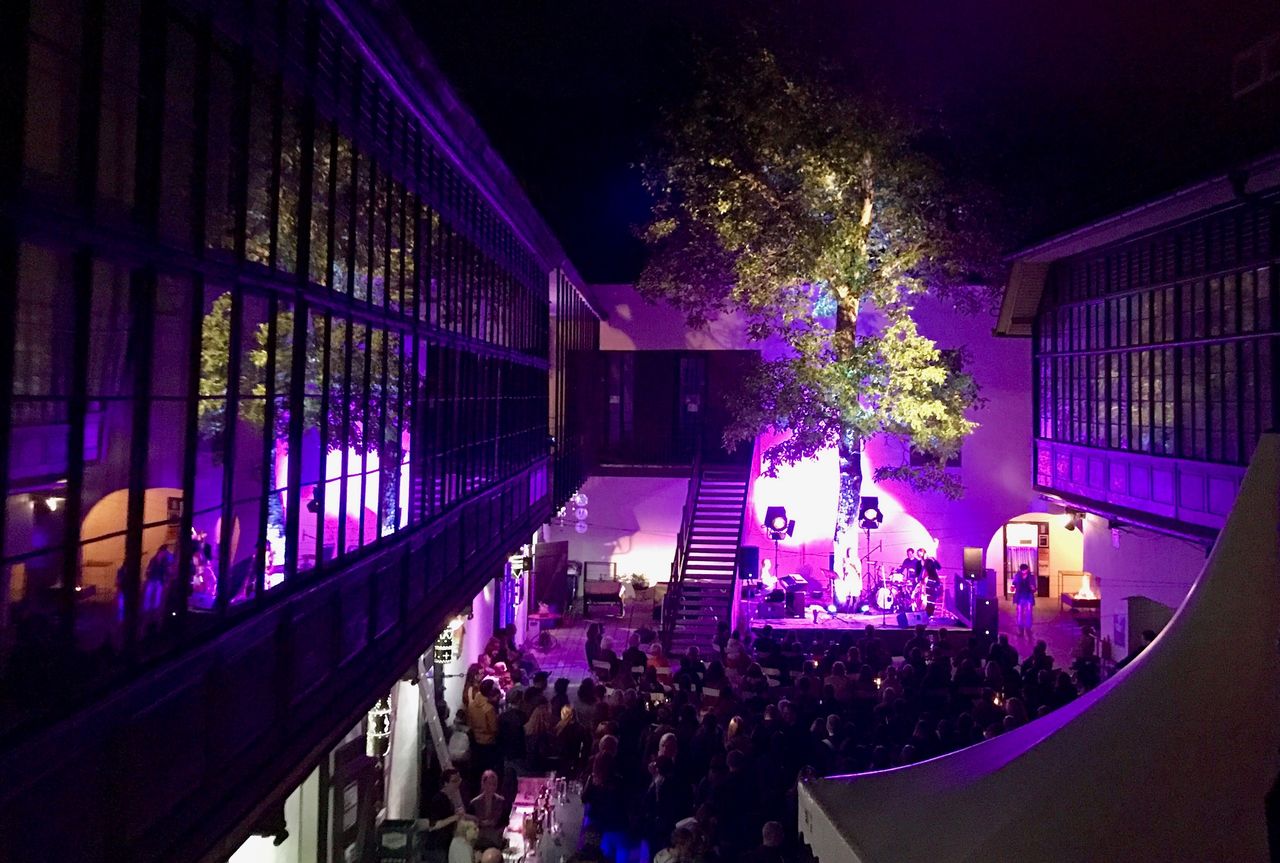
Capacities
The programme use activities provide 5 small- to moderate-sized office spaces and studios and a pair of apartments. The project use activities offer a couple of larger spaces (an atrium, the Vetrinjski exhibition grounds, a foyer and some others) that can be used for multimedia presentations, theatre shows, concerts, exhibitions, receptions and film projections. A number of smaller, multifunctional studios and offices and a pair of open offices are used for co-working, intended for artists and other culture workers.
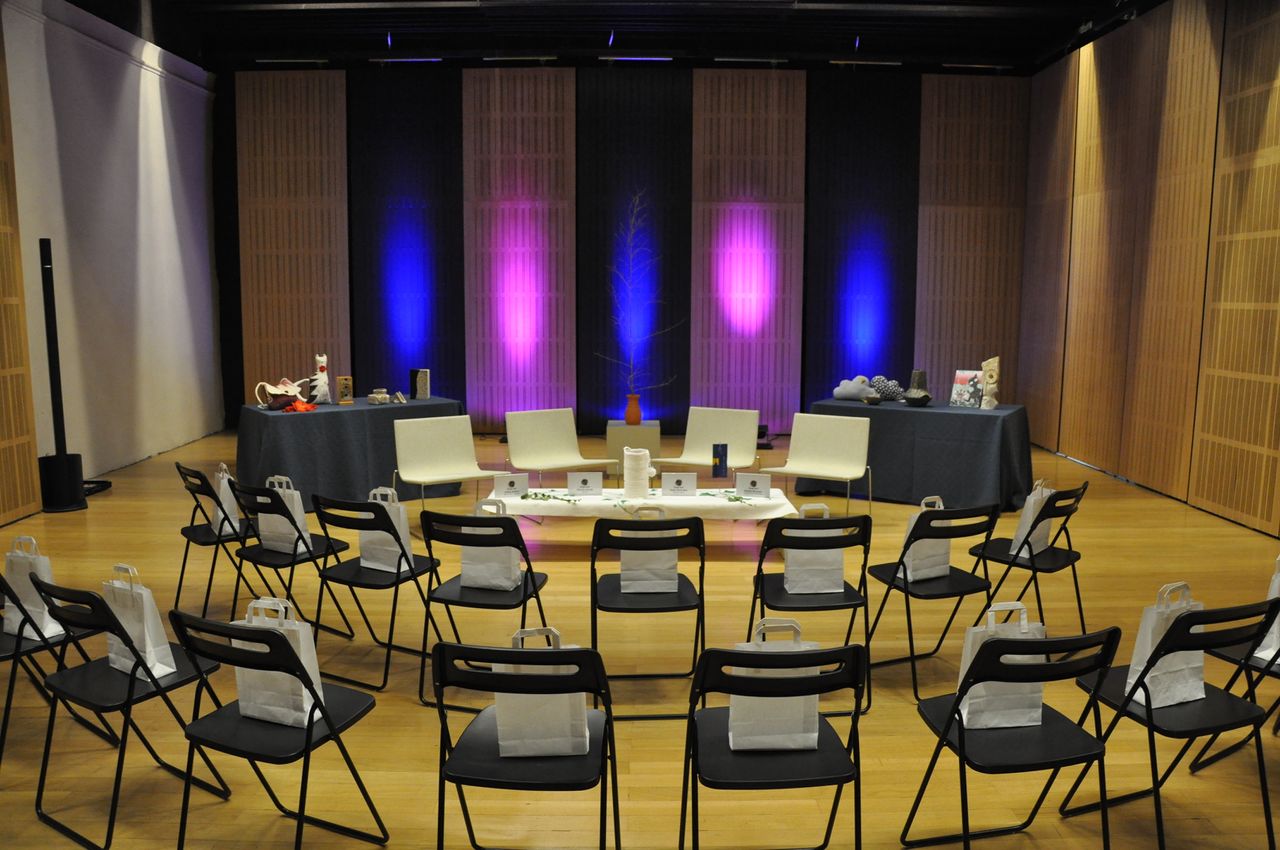
See also
- Art club & cafe Wetrinsky
- Narodni dom Maribor
- Lent Festival
- GuestRoomMaribor
- House! Society for People and Spaces
- CGU Printmaking Art Centre
- Attacca Festival
- Stoptrik International Film Festival
- Arrea Architecture
External links
- Vetrinjski dvor website
- Zavod MARS Maribor website
- CGU - Center grafičnih umetnosti website
- Kulturni klub Dvorec on Facebook
- Zavod MARS Maribor on Facebook
- CGU - Center grafičnih umetnosti on Facebook
- Arrea Architecture's renovation project page




